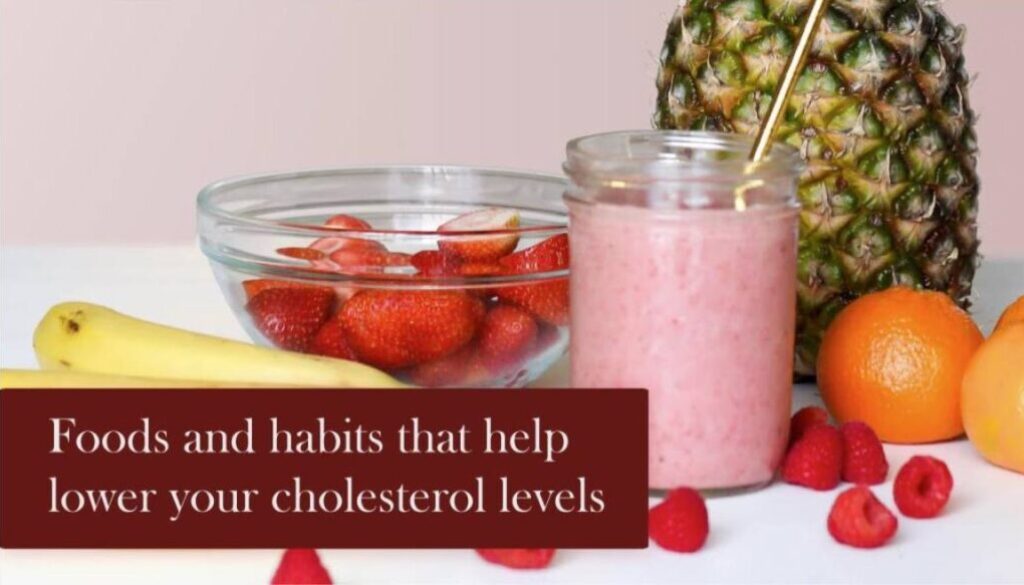Lower Your Cholesterol
FOODS AND HABITS THAT HELP LOWER BAD CHOLESTEROL
We all know that inadequate diets and bad habits can increase the probability of suffering from cardiovascular, heart, and other related diseases. If you are looking to Lower Your Cholesterol, you are at the right place!
In recent years, there have been concerns about the trend of consuming saturated fats over other types of fats. According to recent studies, American adults obtain 11% of their calories from saturated fats. For this reason, Chef Eric decided to share his list of healthy habits and foods to help you lower your cholesterol levels. Cook well, eat well, and BE well – and live longer!
HABITS:
Physical Exercise:
We all know that exercise is a must when talking about healthy habits. The 70/30 rule suggests that 70% is diet and the remaining 30% is physical activity. This rule helps to regulate body weight by helping to raise good HDL cholesterol and lower LDL cholesterol. Remember that being overweight increases triglycerides and therefore bad cholesterol. Aerobic-Type Exercises are recommended. Exercises such as walking, jogging, swimming, dancing, skiing, and pedaling are highly recommended for 30 minutes a day, and 3-4 times a week. A great start is to walk your dog and lift some 5-pound weights!
Avoid Certain Foods:
Avoid the following foods in your daily menu. Saturated fats, sugars, cold cuts, excess alcoholic beverages, frozen juices, and precooked meals. These are pro-inflammatory products since they are ultra-processed foods often high in calories.
Healthy Cooking:
Incorporate healthier cooking techniques and Lower Your Cholesterol! Try to have your foods baked, steamed or grilled. These are great options. Pay attention to your meals, and make sure they are well balanced. Check out Chef Eric’s online cooking video series. These classes can teach you recipes with different and healthy cooking techniques.
Eat Your Veggies & Fruits:
Fruits and vegetables are a good source of vitamins and minerals; including folate, vitamin C, and potassium. They’re an excellent source of dietary fiber, which can help to maintain a healthy gut and prevent constipation and other digestion problems. My latest favorites are raw radishes and raspberries – but not together. I’ve even been known to drink vegetable juice and smoothies with lots of vegetables and vegetable powders – an easy way to incorporate vegetables with a little sweetness from fresh-frozen fruit.
The American Heart Association recommends four servings of fruit and five servings of vegetables per day.
Vegetables have zero cholesterol, and also contain a component called sterol. This element intervenes in the intestine, decreasing the absorption of bad cholesterol. According to MedlinePlus, one serving of fruit, or vegetables must be equivalent to the palm of your hand. Eating vegetables and fruits can reduce the risk of heart diseases, heart attacks, and strokes.
Include Fiber and Antioxidants:
It is recommended to consume between 25 to 35 grams of soluble fiber daily. Soluble fiber is found in foods such as whole-grain products, vegetables, and some fruits – helping to reduce the absorption of cholesterol in the blood. Antioxidants such as vitamin C, carotenes (a component in yellow or orange fruits and vegetables), flavonoids (phytonutrients, plant chemicals such as tea), and lycopenes (a component in red fruits and vegetables) prevent cholesterol from oxidizing and hence plug the arteries.
FOOD:
Here are Chef Eric’s top picks when it comes to the foods you should add to your daily diet:
Olive Oil:
Extra Virgin Olive Oil contains a large amount of sterols that help reduce LDL cholesterol and increase good cholesterol, without increasing triglycerides.
Egg Whites:
You can eat two egg whites with one yolk for breakfast. This option is rich in fatty acids that help increase good cholesterol.
Oatmeal:
This food contains a component that considerably reduces the level of bad LDL cholesterol, beta-glucan. Just 3 grams of uncooked oatmeal added to a natural smoothie does the job!
Soy:
It contains phospholipids that act on the metabolism of fats. In addition to reducing bad cholesterol, it increases good cholesterol, reduces sugar levels, and regulates intestinal transit relieving constipation.
Blueberries:
They are antioxidants and contain Vitamin C. They reduce blood pressure and inflammation in general!
Apples:
This fruit contains flavonoids and antioxidants in its skin, which contributes to the reduction of cholesterol.
Artichoke:
The gallbladder needs cholesterol to function. By consuming artichoke, we are consuming a component called cynarin that makes the gallbladder work more than normal. For this reason, it burns more cholesterol, reducing it from our bloodstream.
Almonds, Walnuts, and Nuts:
Walnuts, almonds, and dried fruits such as Chia should be consumed daily. A maximum of 25 grams per day, due to their high caloric content. It is advisable to consume them raw. You can add them to yogurts, and salads! These also contain good fats, and omega 3 that reduce bad cholesterol, prevent clot formation and provide fiber.
The combination of 20 grams of almonds with 1/4 of a cup of dark chocolate is scientifically recommended as a very heart-healthy snack. I love this snack!
Remember to always consult your doctor before starting a new diet or fitness program!
We hope you’ve enjoyed reading this blog as much as we’ve enjoyed writing it for you. Can’t wait to see you soon! Don’t forget to register for Chef Eric’s newsletter and check out his new cooking video series. You will learn many recipes and culinary techniques that will contribute to your physical and mental well-being. You also can visit his YouTube channel for many instructional videos.




